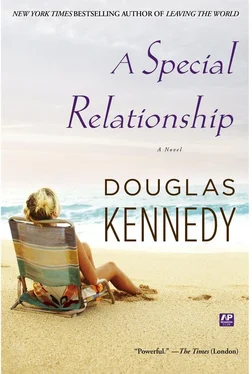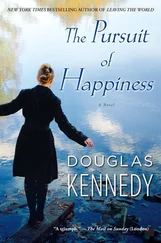All right, maybe I'm exaggerating a bit here - but the fact is, the anti-depressants numbed that part of the brain in which anger and resentment lurked. Had Tony rolled in drunk and turned nasty on me in the past, I certainly wouldn't have forgiven him after one mumbled, hung-over apology. But now, I accepted the cup of coffee, the clumsy kiss on the head, and the nervous tone of contrition.
It wasn't just the drugs that made me so ego te absolvo. There was a deep part of me that was terrified of becoming combative - fearing that it would send out warning signals about my mental stability. Anyway, considering the extremity of my own conduct in the days leading up to my hospitalization, I had to cut Tony some slack here... and let him adjust to having us around again. In turn, he spent the next two weeks being ultra-polite - if a little preoccupied. No, there were no further five-in-the-morning boozing sessions, but he was frequently held up at the paper until nine or ten several nights a week, and - of course - the novel was still flowing (or so he said). Which meant that, around midnight most evenings, he'd excuse himself and vanish upstairs.
I didn't complain. I just travelled down the anti-depressant path of least resistance. When he wanted to share our bed (around twice a week) and have sex with me, I was pleased. When he 'needed' to stay out late at the Chronicle and/or hide upstairs, I accepted it. I was just grateful that we had silently negotiated a degree of familial stability between us and that my own stability was holding up.
Another curious thing about the slow progression out of depression: you begin to crave routine. And dealing with a baby is certainly bound up in the metronomic regularity of feeds, diaper changes, the usual gaseous post-bottle discomfort, rocking him to sleep, being close at hand at all times, coping with colic, coping with another feed, another diaper change, the usual gaseous post-bottle...
More tellingly I was now so enjoying my son. Gone was the terrible fear that I couldn't handle the basics of motherhood, let alone that terrifying postnatal fear that I would do him harm. On the contrary, I now delighted in his company - revelling in the way his hand closed round my finger, the way he nuzzled his head against mine as I held him, the fact that it was so wonderfully easy to make him laugh.
'Sounds like you guys really are an item now', Sandy said to me after I mentioned the sheer pleasure I was getting from Jack's company.
'He's a terrific kid', I said.
'It's great to hear you so up. You must be relieved'.
'Just a little', I said with a laugh.
As I wasn't exactly on the lookout for great intellectual or professional stimulation right now - and also seriously wanted to keep everything on a profoundly even keel - I accepted this circumscribed domestic routine with a certain degree of relief. Cha the cleaner was on hand from nine until midday every morning - and she proved herself to be highly capable with Jack. She kept him happy while I caught up with sleep or took myself off for a walk down the tow path. She organized his clothes, dealt with all the paraphernalia of babyhood, and gave me a necessary three-hour respite from motherhood... which I was then happy to resume.
One morning, sitting in Coffee Republic on the High Street, nursing a latte, looking at all the other moms with pushchairs around me, staring out at the monocultural blandness of Putney's main thoroughfare, the thought struck me: this is my life now.
And the New England stoic in me reasoned: you have managed to survive a major tumble into deep deranged muck. You've come through - shakily, but you are functioning. You seem to have achieved an entente cordiale with your husband. You have your son - with whom you are now fully engaged. Eventually, you will find your way back to the - workaday world. But for now...
This is my life.
And it could be far worse - or marked by real misfortune.
Like my poor sister Sandy. She rang me late the next night in a state of convulsive shock. Her ex-husband, Dean, had been killed earlier that day in a climbing accident on Mount Kathadin in northern Maine. A trail guide, he'd been leading a group across a particularly treacherous corner of the mountain known as The Knife Edge, because it was just that: a thin finger of terra firma spanning a deep gorge. Dean must have traversed it several dozen times and was an experienced mountaineer. But earlier that morning a wind blew up and sent him right over the edge. They found his body a few hours later - his neck snapped like a twig, his head caved in. Instantaneous death, they figured.
'He probably never knew what hit him', Sandy said.
I thought: given that he'd fallen nearly a thousand feet, he must have been aware of what was going to hit him - that, verily, his life was about to end. But I didn't say this to her.
'Dumb bastard', Sandy said, crying. 'I always warned him about that damn mountain. You know, we climbed it on our honeymoon...'
I did remember - and always thought what a strange thing to do to celebrate a new marriage. But Dean was always outdoorsy, and Sandy was madly in love with him at the time, and love will make you do completely out-of-character things like climb a mountain, even though Sandy was the type who preferred avoiding stairs whenever possible.
'You know what really gets me: that one time we went up Kathadin together, I kept doing this big song-and-dance when we reached The Knife Edge about how I couldn't cross it; that it was just too terrifying for me, and I'd end up stranded in the middle of the trail. Know what Dean said? "I'll never leave you stranded anywhere." And, of course, I believed him'.
She started to cry again - telling me her three boys were taking the news hard, and that Dean's new girlfriend was distraught. I'd never met the woman - but I always disliked her, because of her role as the happy home-wrecker. Now, however, all I could feel was desperate pity for her - especially as she was at the back of the climbing group when the accident happened, and saw him go over.
And there was Sandy - now weeping uncontrollably over the death of a man whom, just a few weeks earlier, she was referring to as 'that scumbag ex-husband of mine'. But that's the nature of a divorce, isn't it? You find yourself loathing that person around whom your world once centred. Sometimes you cannot help but wonder if the reason you now despise him is because you still so desperately love him.
Sandy said that the funeral would be in three days' time. Immediately, I said, 'I'll be there'. She argued that I was in no fit state to cross the Atlantic; that she had the three boys to support her. But I knew that three kids under the age of twelve were going to need support of their own during this horrendous time. So I said, 'I think I can do this'. And I told her I'd get back to her within a few hours.
Tony was exceptionally sympathetic when I informed him of the news. He virtually insisted that I go - offering to get his secretary to book the ticket to Boston for me, while also suggesting that I call Annie's Nannies to see if they could find full-time round-the-clock help for four or five days.
'But won't that cost us a fortune?' I asked.
'It's a family emergency' he said.
But before I called the nanny agency, I phoned Dr Rodale - and was fortunate enough to catch her during office hours at her private rooms on Wimpole Street. She'd seen me for a fast consultation at the hospital just last week, and seemed genuinely pleased with my progress. Not pleased enough to lower my dosage of anti-depressants, but confident enough about my current stability to okay me to travel the Atlantic.
That day, Cha was in working - and when I mentioned that I would be out of the country for seventy-two hours and was having to find a full-time nanny, she told me she'd do the job for £100 a day, all in. I hired her on the spot. That afternoon, we moved one of the single beds I'd bought for the guest room into the nursery, so Cha could sleep next to Jack. When I told Tony of this arrangement, he seemed pleased with it... especially as it also meant not having to pay agency fees, let alone bringing a stranger into the house. Nor did I have to indulge in the usual paranoid fantasies about a husband left alone in a house with a nanny - as I thought that, even at his most drunken, there's no way that he would make a pass at a fifty-five-year-old Thai house cleaner.
Читать дальше












